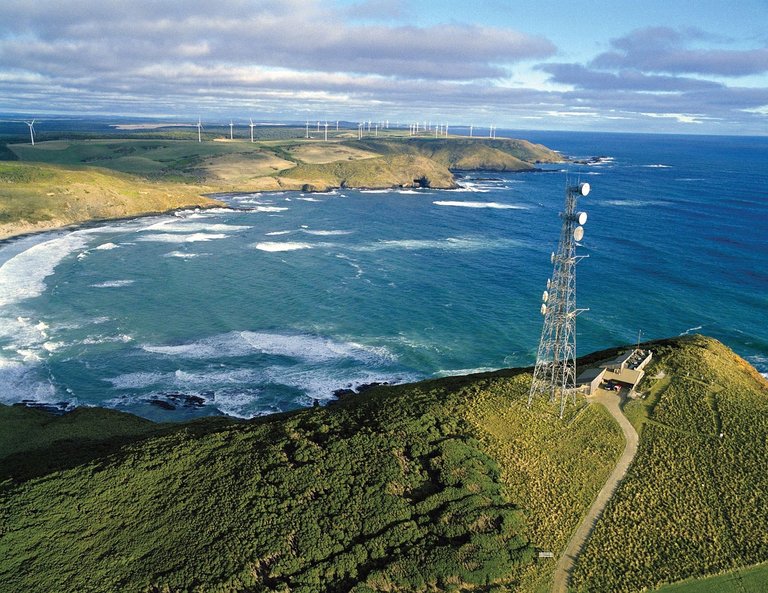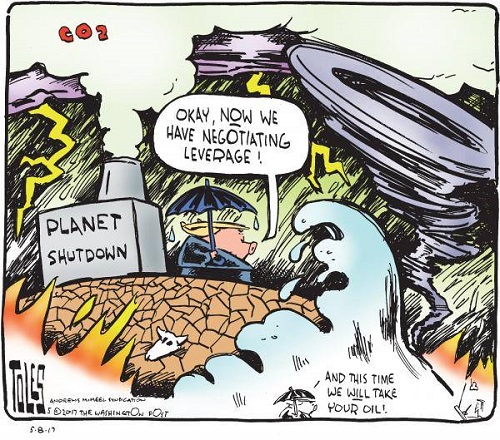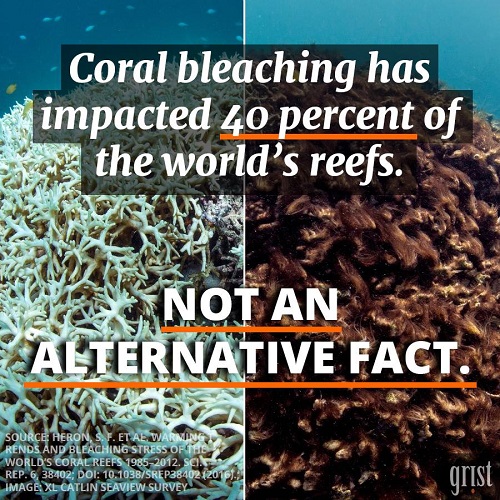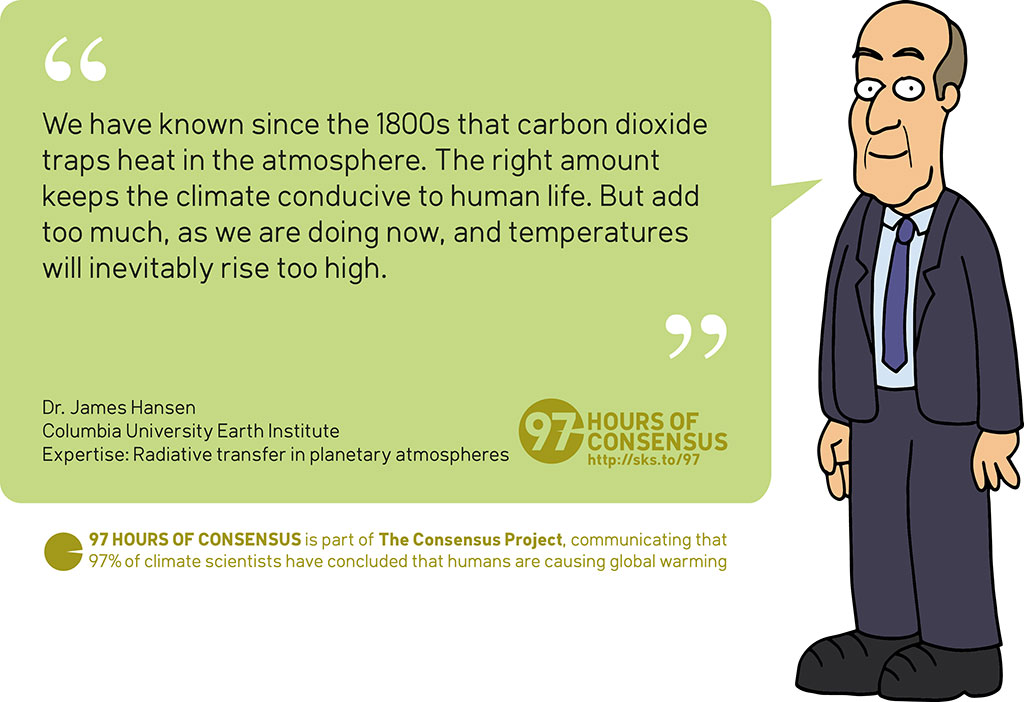2017 SkS Weekly Climate Change & Global Warming Digest #26
Posted on 2 July 2017 by John Hartz
Story of the Week... Toon of the Week... Quote of the Week... Coming Soon on SkS... Poster of the Week... Climate Feedback Reviews... SkS Week in Review... 97 Hours of Consensus...
Story of the Week...
Carbon in Atmosphere Is Rising, Even as Emissions Stabilize

The Cape Grim Baseline Air Pollution Station in Tasmania. Credit: Commonwealth Scientific and Industrial Research Organization (CSIRO)
CAPE GRIM, Tasmania — On the best days, the wind howling across this rugged promontory has not touched land for thousands of miles, and the arriving air seems as if it should be the cleanest in the world.
But on a cliff above the sea, inside a low-slung government building, a bank of sophisticated machines sniffs that air day and night, revealing telltale indicators of the way human activity is altering the planet on a major scale.
For more than two years, the monitoring station here, along with its counterparts across the world, has been flashing a warning: The excess carbon dioxide scorching the planet rose at the highest rate on record in 2015 and 2016. A slightly slower but still unusual rate of increase has continued into 2017.
Scientists are concerned about the cause of the rapid rises because, in one of the most hopeful signs since the global climate crisis became widely understood in the 1980s, the amount of carbon dioxide that people are pumping into the air seems to have stabilized in recent years, at least judging from the data that countries compile on their own emissions.
That raises a conundrum: If the amount of the gas that people are putting out has stopped rising, how can the amount that stays in the air be going up faster than ever? Does it mean the natural sponges that have been absorbing carbon dioxide are now changing?
Carbon in Atmosphere Is Rising, Even as Emissions Stabilize by Justin Gillis, New York Times, June 26, 2017
Toon of the Week...

Quote of the Week...
The basics of scientists’ understanding of climate change can be communicated in five key points: It’s real, it’s caused by humans, it’s bad, the experts agree, and there’s still hope for fixing it, according to John Cook, a research assistant professor at George Mason University’s Center for Climate Change Communication.
“When you look at all the climate denial arguments, they’re basically the flip of all that: It’s not real, it’s not us, it’s not bad, the experts disagree or the experts are unreliable, and there’s no hope, we can’t fix it,” Cook told HuffPost. “You expect them to be moving along that spectrum.”
Don’t Be Fooled By The Gentler Tone Of Charles Koch’s Climate-Change Denial by Alexander C Kaufman, HuffPost, June 26, 2017
SkS Spotlights...
Nature World News offers fascinating and comprehensive news about the scientific world. Whether it's about animals, health, space, or archaeological finds, the website brings out the science geek in every reader, fostering an improved appreciation of our environment.
Our writers and editors are dedicated to dissect and interpret complex information from the latest scientific studies to deliver articles that are easily digestible. We get our information from authoritative sources, world’s leading scientists, experts and researchers, encompassing a variety of topics — animals, biology, environment, health and medicine, technology, travel, and space.
We live in a world where we depend on science and technology for our everyday life; yet, almost no one understands it. At Nature World News, by using accessible journalism, we hope to make complicated science easier to understand.
Coming Soon on SkS...
- 2017 SkS Weekly Climate Change & Global Waming Digest #26 (John Hartz)
- 'The best data we have' just got a lot hotter (John Abraham)
- Mapped: Climate change laws around the world (Simon Evans)
- Rick Perry's 'I don't believe that' – the slogan for climate denial (Dana)
- Republicans want taxpayers to pay for a 'Red Team' of climate science losers (John Abraham)
- ClimateChats: Climate Pictures (Adam Levy)
- 2017 SkS Weekly Climate Change & Global Warming News Roundup #27 (John Hartz)
Poster of the Week...

Climate Feedback Reviews...
Climate Feedback asked its network of scientists to review 95-Degree Days: How Extreme Heat Could Spread Across the World by Brad Pulmer & Nadja Popovich, New York Times, June 22, 2017
Four scientists analyzed the article and estimated its overall scientific credibility to be ‘high’.
A majority of reviewers tagged the article as: Accurate.
Click here to acess the entire review.
SkS Week in Review...
- 2017 SkS Weekly Climate Change & Global Warming News Roundup #26 by John Hartz
- Trump fact check: Climate policy benefits vastly exceed costs by Dana Nuccitelli (Bulletin of the Atomic Scientists)
- SkS Analogy 9 - The greenhouse effect is a stack of blankets by Evan
- Climate scientists just debunked deniers' favorite argument by Dana Nuccitelli (Climate Consensus - the 97%, Guardian)
- We are heading for the warmest climate in half a billion years by Gavin Foster (The Conversation AU)
- New study confirms the oceans are warming rapidly by John Abraham (Climate Consensus - the 97%, Guardian)
- 2017 SkS Weekly Climate Change & Global Warming Digest #25 by John Hartz
97 Hours of Consensus...

Quote derived with author's permission from:
"We have known since the 1800s that carbon dioxide traps heat in the atmosphere. The right amount keeps the climate conducive to human life. But add too much, as we are doing now, and temperatures will inevitably rise too high. This is not the result of natural variability, as some argue. The earth is currently in the part of its long-term orbit cycle where temperatures would normally be cooling. But they are rising — and it’s because we are forcing them higher with fossil fuel emissions."































 Arguments
Arguments






























I would prefer that the 5 key points say that 'humans have accelerated the process' instead of 'caused by' because there are so many factors that fluctuate. Finding the middle ground might dilute the extremes.
@LRDT:
I have responded to you on this topic on this more appropriate thread.
If you have similar question on that topic, place them there, and not here.
I thought that this article in the Los Angeles Times about 5,000 dairy cows dying during a heat wave was interesting. The local redering facilities were overfll so they ahve nowhere to take all the bodies.
When someone says that the effects of AGW will only be felt in the future this is a good example of currrent effects of too much heat. But who cares of milk and other dairy products cost more?/sark
For the next weekly digest? :
NYMagazine: "...What CC could wreak..."
Much discussed at various places online and on twitter...
Oops, I see that you already addressed this in the comments section of the more recent WD. I still think that it is an important discussion for SkS to be in on, but it's obviously up to you all.